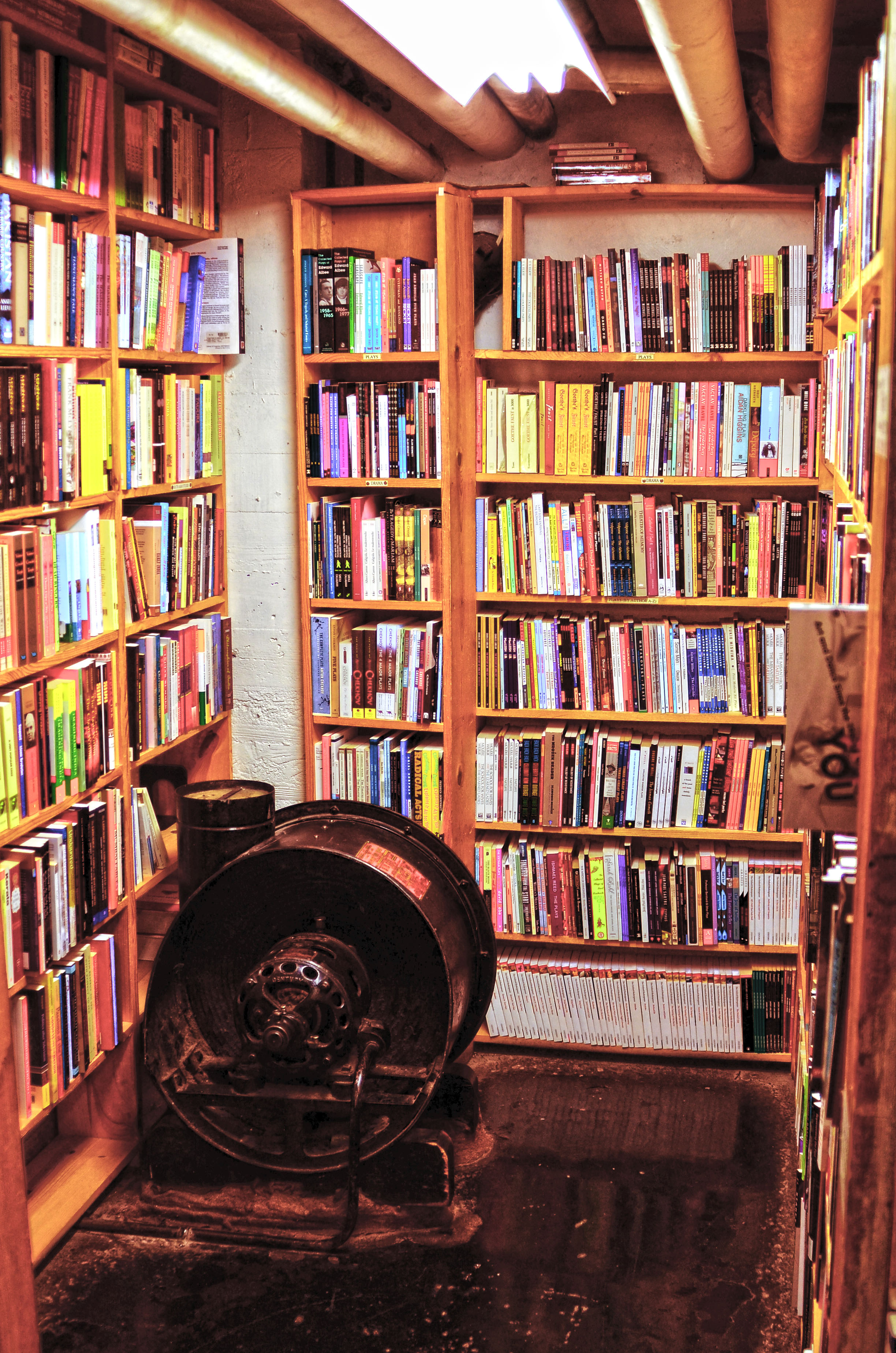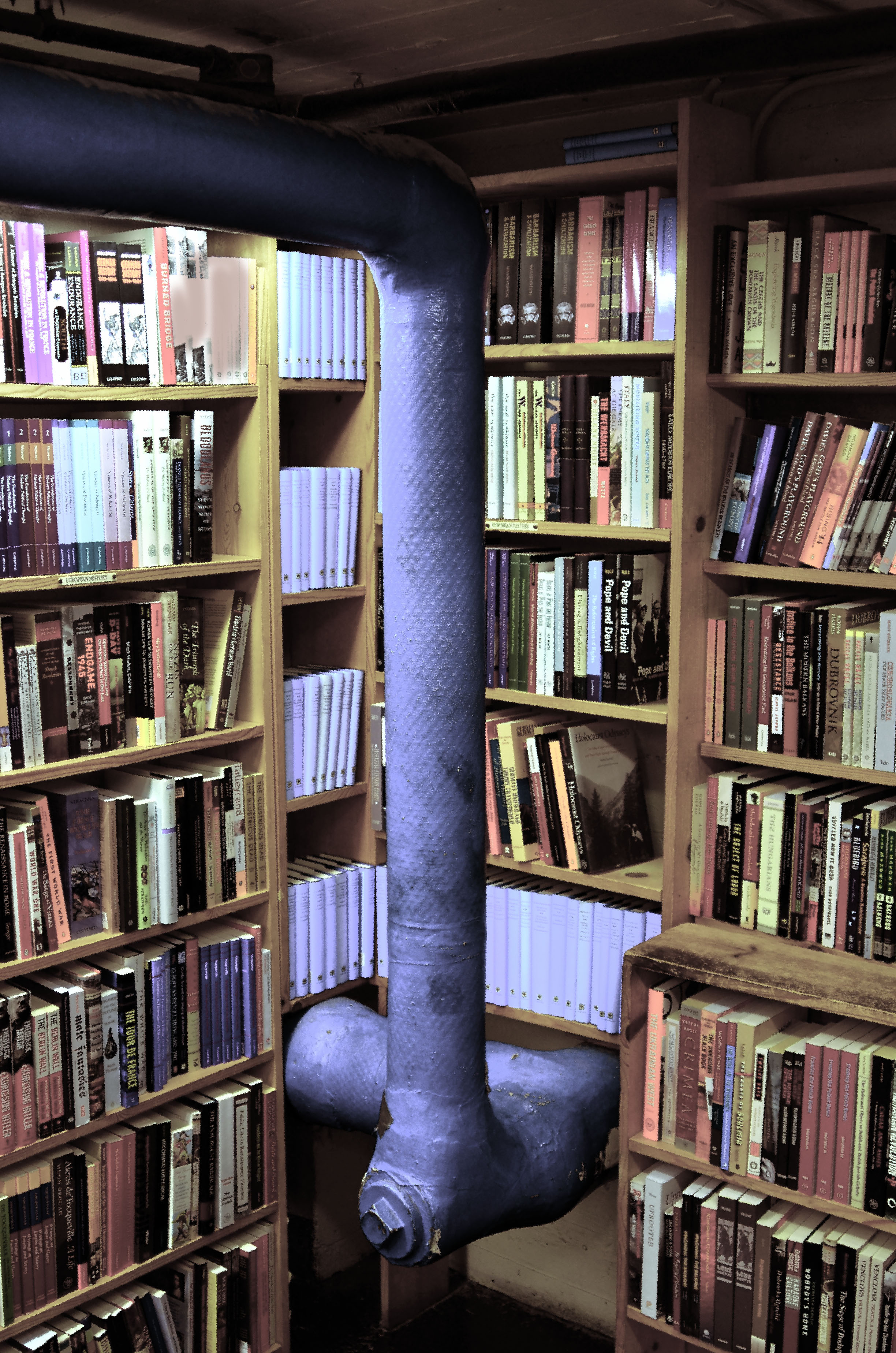| « A Conversation with Local Authors at Harold Washington Library | Michael Moreci's Short Pulp Fiction » |
Feature Mon Sep 19 2011
Landmark Seminary Co-op Bookstore, 50 Years Young
This October, the Seminary Co-op will celebrate its 50th birthday, and within a year it will say goodbye to its cherished home in the basement of the Chicago Theology Seminary -- a winding and seemingly endless labyrinth of books. This is the first of a three-part series on the bookstore; read parts two and three, detailing how the publishing industry has changed and the shop's many stories.
Part One: The History
Chicagoans aren't known for mincing words. While many proclaim their city home to the best university in the world, they may not realize that Chicago also lays claim to the world's greatest academic bookstore -- an opinion widely held, even by those who think that title belongs on the east coast.
This October, the Seminary Co-op will celebrate its 50th birthday, and within a year it will say goodbye to its cherished home in the basement of the Chicago Theology Seminary -- a winding, and seemingly endless, labyrinth of books.
No coffee, no knick-knacks, just books.
As independent bookstores across the globe have suffered and closed under the expansion of Amazon and big-box bookstore chains, the story of the Co-op is instructive. Beyond simply surviving, it has thrived by gradually, organically, becoming the model for what a stellar community bookstore should be.
The Co-op was born in 1961 when 17 individuals, many of them students at the Chicago Theological Seminary and the University of Chicago Divinity School, pitched in about $10 each. The capital grew slowly with the membership, which currently clocks in around 54,000 members world-wide -- 18,000 of them in the Hyde Park zip code.
While Hyde Park now has an impressive roster of bookstores, this was not the case for the Co-op's founders. "The feeling was that Hyde Park was not well-served by bookstores. Most of the original incorporators were students, and they [not only] wanted something that was owned by its customers. They also wanted something that would more directly provide what students [and faculty] wanted, then possibly what the University store was then doing."
While Co-op manager Jack Cella wasn't one of the original founders, his name is still synonymous with the store he runs so well. A graduate student at the Divinity School in 1968, he remembers taking courses from such big names as David Tracy and Mircea Eliade. After about one year, he took a part-time job at the co-op. "I was impressed, when I first walked down there. I was making $1.35 an hour."
Cella may have moved from the Div School to the Philosophy Department, but he never left the Co-op. His transition from casual employee to manager "was a gradual movement, probably for a long time without any real decision. That became, after a while, the main focus. And after a while it became the entire focus."
It is, perhaps, Cella's focus and expertise on books that have contributed to the Co-op being held as a model to emulate -- as well as a source of envy for other universities. "Over the years we've been asked to consider opening up stores elsewhere, and we were really pretty close one time to opening up a store in New York [City]."
 The expansion of the Co-op eastward was not to be, however, since "[its] success has been that it's tried to remain resolutely local...Although, the Board's declining to open a store near Columbia got a tremendous amount of publicity - much more for saying we're not going to move to New York than we've ever gotten for anything else!"
The expansion of the Co-op eastward was not to be, however, since "[its] success has been that it's tried to remain resolutely local...Although, the Board's declining to open a store near Columbia got a tremendous amount of publicity - much more for saying we're not going to move to New York than we've ever gotten for anything else!"
While Columbia didn't get the Co-op, it eventually opened Labyrinth (since changed to Book Culture), which was in many ways modeled on the Hyde Park store. The difficulty of emulating this particular store is, in part, that it grew very slowly and organically over many years, with more bookshelves being added wherever they could find room. Despite this, "people, when they ask, really want a store full-blown, but the model of this one" has succeeded precisely because it developed naturally.
It's worth asking, of course, whether a bookstore like the Co-op could have grown up in any environment other than the community around the University of Chicago. For Cella, "the things that are interesting [about working at the Co-op] are two, primarily: the books on the shelves, and the people that come in." Hyde Park is a "stimulating" community where "people don't hesitate to make suggestions. They're not shy about complimenting you, but they're equally not shy about saying something when things aren't going the way they think they should go."
It was due to suggestions from the "extraordinary" community of Hyde Park denizens that the Co-op has expanded to include new sections, to group certain books together, or give some categories their own sections.
Heather Ahrenholz, assistant manager at the Co-op and employee for 20 years, agrees. "We couldn't survive if it weren't for this community. We're completely symbiotic."
This South Side community, which the Co-op has devoted itself to serving and representing, was once "terra incognita" for publishers. When the Co-op opened its second store, 57th Street Books, in 1983, they had a hard time getting touring authors down to Hyde Park for literary events.
"Chicago at that time was dominated by local chain Kroch's and Brentano's," says Cella, "and publishers thought that if they sent an author to Chicago, all Chicago consisted of was the central part of the downtown area -- or, maybe the North Shore." The most difficult thing, for them, was to convince publishers that "there is more to Chicago than Wilmette and the Loop." That Chicago was a wasteland of books was, primarily, "New York's view".
Ahrenholz concurs that the relative isolation of Hyde Park, and being "surrounded by some pretty downtrodden neighborhoods," has been a challenge for many businesses. Even today, a local reluctance to venture to the South Side may still exist, since "there are a lot of people in Chicago who, I think, are afraid to come down to Hyde Park. They still see it as the scary South Side."
Nevertheless, 57th Street Books now holds approximately 150 author events each year. With the Co-op's eventual move, one block east, to their new location (5751. Woodlawn) next to the Robie House, they plan to do even more. "[The new location] is not that big," says Cella, "but we've gotten by with 2,800 square feet, so 8,000 square feet seems enormous." This will allow them to open the space to both community and campus groups, in the hopes that their bookstore can also serve as a community center for literature and intellectual discussion.
 There is also space set aside for a coffee shop. "We won't be running the coffee shop -- thank God!" he laughs.
There is also space set aside for a coffee shop. "We won't be running the coffee shop -- thank God!" he laughs.
The new location will be above ground on the first floor, so for the first time Co-op customers will be able to browse books while, perhaps, gazing out a window. The store will also enjoy the creature comforts of air conditioning, climate control, and will be far more accessible than its current home.
These benefits, however, will surely come with a sense of loss. "There's a lot of nostalgia people are going to have about this place," Ahrenholz knows. Some even became defensive on their behalf, "thinking we were being forced out." But both she and Cella seem to see this move as another, natural change for the Co-op to go through, growing as it does so. "We're going to have to think about what it means to be a bookstore to keep moving forward," she continues, specifically by "redefining what it means to be a brick and mortar bookstore" in an increasingly digital world.
Because she's "spent more time [at the Co-op] than any other location in my entire life," however, it will still "be very strange having this physical space not being here anymore. It'll be strange not to ever walk into this particular place again."
At the very least, however, there's talk of taking some mementos of the Co-op with them when they move, said Cella. "There are some industrial artifacts...such as a mechanical bellows, that hasn't been connected to anything for several years."
Should that fail, perhaps a simple piece of pipe -- for the customer who requested it, hoping to still "bump their head every once in a while."
Next:
Part Two: The Changing Industry
Part Three: The Stories
This feature is supported in part by a Community News Matters grant from The Chicago Community Trust and the John S. and James L. Knight Foundation. More information here.










